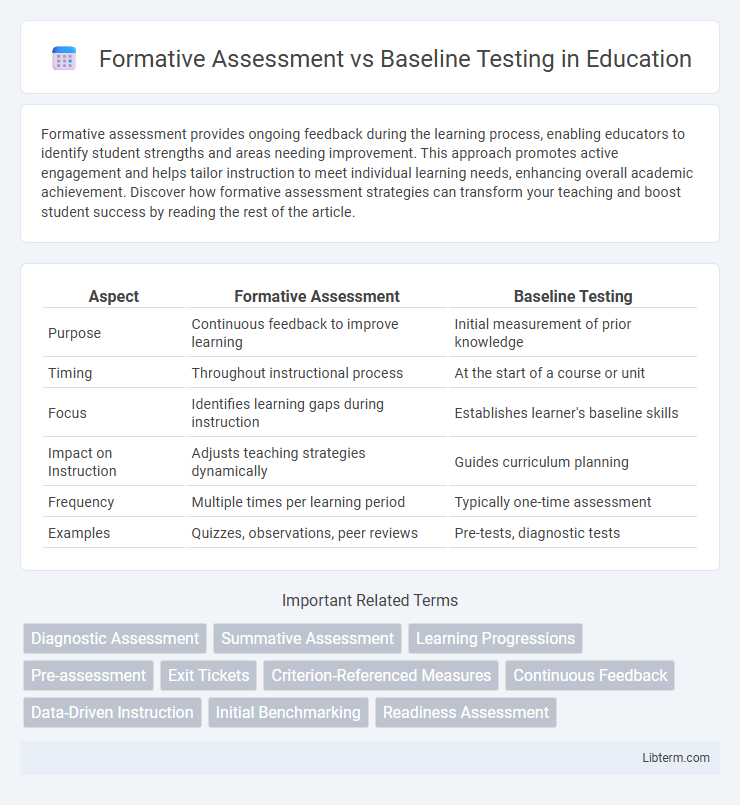Formative assessment provides ongoing feedback during the learning process, enabling educators to identify student strengths and areas needing improvement. This approach promotes active engagement and helps tailor instruction to meet individual learning needs, enhancing overall academic achievement. Discover how formative assessment strategies can transform your teaching and boost student success by reading the rest of the article.
Table of Comparison
| Aspect | Formative Assessment | Baseline Testing |
|---|---|---|
| Purpose | Continuous feedback to improve learning | Initial measurement of prior knowledge |
| Timing | Throughout instructional process | At the start of a course or unit |
| Focus | Identifies learning gaps during instruction | Establishes learner's baseline skills |
| Impact on Instruction | Adjusts teaching strategies dynamically | Guides curriculum planning |
| Frequency | Multiple times per learning period | Typically one-time assessment |
| Examples | Quizzes, observations, peer reviews | Pre-tests, diagnostic tests |
Understanding Formative Assessment
Formative assessment is an ongoing process that provides real-time feedback to both teachers and students, enabling adjustments in instruction and learning strategies to improve student outcomes. Unlike baseline testing, which captures a single snapshot of students' prior knowledge at the start of a course, formative assessments continuously monitor progress through quizzes, observations, and discussions. This dynamic approach supports personalized learning by identifying strengths and areas for growth throughout the educational journey.
What is Baseline Testing?
Baseline testing establishes a student's initial knowledge and skill level before instruction begins, serving as a reference point for measuring academic progress. It involves standardized assessments that identify strengths and weaknesses, enabling educators to tailor teaching strategies effectively. By providing data on starting competencies, baseline testing supports targeted interventions and helps track growth throughout the learning process.
Key Differences Between Formative Assessment and Baseline Testing
Formative assessment provides ongoing feedback during the learning process to identify student progress and guide instructional adjustments, whereas baseline testing establishes students' initial knowledge or skills before instruction begins. Formative assessments are typically informal, frequent, and focused on improving learning outcomes, while baseline tests are formal, one-time measures used primarily for benchmarking and planning. The key differences lie in their timing, purpose, and application within educational settings.
Purposes of Formative Assessment
Formative assessment is designed to monitor student learning and provide ongoing feedback that can be used by instructors to improve teaching and by students to enhance their understanding. Its primary purpose is to identify learning gaps in real-time, allowing timely interventions that support student progress and mastery of content. Unlike baseline testing, which establishes initial knowledge levels, formative assessment continuously informs instructional adjustments to optimize educational outcomes.
Objectives of Baseline Testing
Baseline testing aims to establish students' existing knowledge, skills, and abilities at the start of an instructional period to inform targeted teaching strategies and curriculum adjustments. It provides a clear reference point for measuring academic growth and identifying learning gaps, enabling educators to tailor interventions effectively. By capturing initial proficiency levels, baseline testing supports data-driven decision-making and personalized learning plans that enhance overall educational outcomes.
Timing and Frequency: When Are They Used?
Formative assessment is conducted continuously throughout the learning process to provide ongoing feedback and guide instructional adjustments, typically administered multiple times during a course or unit. Baseline testing occurs at the beginning of a learning period to establish students' initial knowledge and skills, serving as a reference point for measuring growth. Timing and frequency distinguish these assessments: baseline testing is singular and diagnostic, while formative assessment is recurrent and developmental.
Impact on Student Learning and Progress
Formative assessment provides ongoing feedback that guides instructional adjustments, promoting continuous student learning and skill development. Baseline testing establishes initial student proficiency levels to tailor educational goals and measure growth accurately over time. The combination of both practices enhances personalized learning paths and improves overall academic progress tracking.
Tools and Methods for Implementation
Formative assessment employs tools such as quizzes, observations, and interactive discussions to provide real-time feedback and adjust instruction dynamically. Baseline testing utilizes standardized assessments and diagnostic tests at the start of instruction to establish students' initial skill levels and knowledge gaps. Both methods integrate digital platforms like Learning Management Systems (LMS) and data analytics software to enhance accuracy and streamline implementation.
Challenges in Formative Assessment and Baseline Testing
Formative assessment faces challenges such as maintaining student engagement, providing timely and specific feedback, and accurately measuring ongoing learning progress in diverse classroom settings. Baseline testing often encounters difficulties including establishing a true starting point without prior learning influence, ensuring test reliability across varied populations, and avoiding test anxiety that may skew initial performance data. Both assessment types must address issues of validity, fairness, and adaptability to accurately inform instructional decisions and student growth monitoring.
Choosing the Right Approach for Educational Success
Formative assessment offers continuous feedback to guide student learning and instructional adjustments, while baseline testing provides initial data to establish students' starting knowledge levels. Selecting the appropriate approach depends on educational goals: formative assessments enhance ongoing performance and mastery, whereas baseline tests inform curriculum planning and identify learning gaps early. Integrating both methods strategically maximizes personalized instruction and overall educational success.
Formative Assessment Infographic

 libterm.com
libterm.com